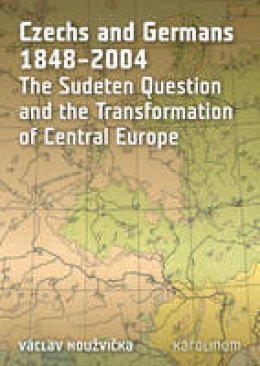
Stock image for illustration purposes only - book cover, edition or condition may vary.
Czechs and Germans 1848-2004
Vaclav Houzvicka
€ 31.58
FREE Delivery in Ireland
Description for Czechs and Germans 1848-2004
Paperback. Describes the development of the Czech-German national controversies from the mid-nineteenth century through the establishing of the Czechoslovak Republic in 1918 and finally to the beginning of the twenty-first century. Num Pages: 450 pages, 15 halftones, 3 maps. BIC Classification: 1DFG; 1DVKC; 3JH; 3JJ; 3JMC; HBJD; HBLL; HBLW; HBLX. Category: (G) General (US: Trade). Dimension: 250 x 150 x 15. Weight in Grams: 666.
In Czechs and Germans 1848-2004 , Vaclav Houzvicka describes the development of the Czech-German national controversies from the mid-nineteenth century through the establishing of the Czechoslovak Republic in 1918 and finally to the beginning of the twenty-first century. He focuses mainly on the tragic end of the nations' coexistence in 1938-1945 and the development - in the latter part of the twentieth century - of differing Czech and German explanations for the reasons the Germans were removed from the Czechoslovak Republic after 1945. A detailed explanation of Czech, German, and Sudeten-German concepts is rendered coherently and in detail within the international and socioeconomic context of the twentieth century.
Product Details
Publisher
Karolinum,Nakladatelstvi Univerzity Karlovy,Czech Republic Czech Republic
Number of pages
450
Format
Paperback
Publication date
2016
Condition
New
Number of Pages
450
Place of Publication
Ovocny, Czechia
ISBN
9788024621449
SKU
V9788024621449
Shipping Time
Usually ships in 7 to 11 working days
Ref
99-50
About Vaclav Houzvicka
Vaclav Houzvicka is a member of the Czech Academy of Sciences, Institute of Sociology, and a lecturer at the University in Usti nad Labem.
Reviews for Czechs and Germans 1848-2004
The issue reflected in the title of this volume is deeply rooted in the history of the Czech lands. It became particularly controversial in the aftermath of WWI, when the German-speaking population, chiefly resident in the Sudeten lands of the Bohemian (Czech) territories of the former Habsburg empire, had to choose to become part of Germany or the new Czechoslovakia. The Nazis subsequently exploited these tensions and destroyed the new state. After WWII, Germans were forcibly expelled from the Czech lands. Following the end of the Cold War, these Germans have made efforts to recover what they regard as their lost territories. Houzvicka carefully traces these historical and current developments in this scholarly and relatively dispassionate study (effectively translated from the Czech original). The author's main focus in the volume's last chapters is to examine renewed demands from Sudeten Germans and the challenges these present in Central Europe. His helpful conclusion identifies, point-by-point, issues and problems. Well-chosen illustrations, maps, texts of nine categories of documents, and an excellent bibliography enhance the volume. . . . Recommended.
P. W. Knoll, University of Southern California Choice Houzvicka sheds light on topics associated with central European transitional historical periods and developments too often shrouded in convoluted controversy. . . . The book makes an immense contribution to the fields of continental history, Slavic studies, and political science, whose readership should certainly consult it.
Slavic Review
P. W. Knoll, University of Southern California Choice Houzvicka sheds light on topics associated with central European transitional historical periods and developments too often shrouded in convoluted controversy. . . . The book makes an immense contribution to the fields of continental history, Slavic studies, and political science, whose readership should certainly consult it.
Slavic Review
